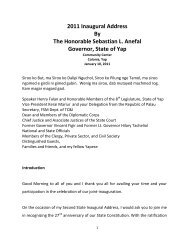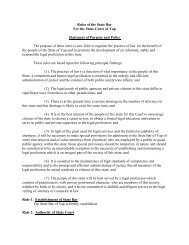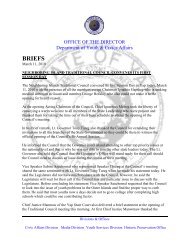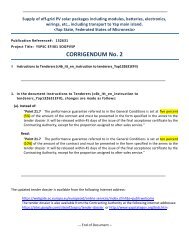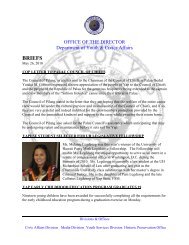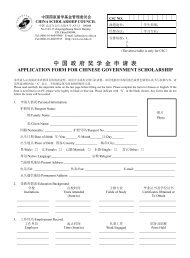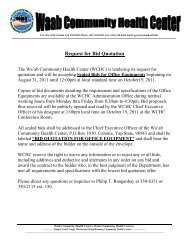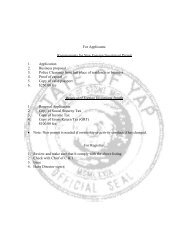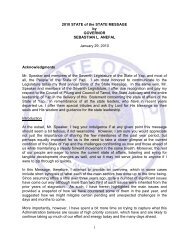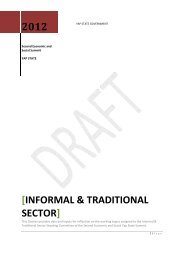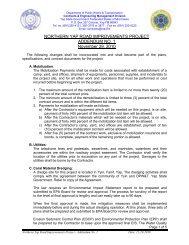RULES OF CIVIL PROCEDURE For the Trial Division of the Yap ...
RULES OF CIVIL PROCEDURE For the Trial Division of the Yap ...
RULES OF CIVIL PROCEDURE For the Trial Division of the Yap ...
You also want an ePaper? Increase the reach of your titles
YUMPU automatically turns print PDFs into web optimized ePapers that Google loves.
as provided in Rule 41(b). Attorneys or trial counselors shall submit proposed findings <strong>of</strong><br />
fact and conclusions <strong>of</strong> law upon direction <strong>of</strong> <strong>the</strong> court.<br />
(b) Amendment. Upon motion <strong>of</strong> a party made not later than 10 days after entry <strong>of</strong><br />
judgment <strong>the</strong> court may amend its findings or make additional findings and may amend<br />
<strong>the</strong> judgment accordingly. The motion may be made with a motion for a new trial<br />
pursuant to Rule 59. The question <strong>of</strong> <strong>the</strong> sufficiency <strong>of</strong> <strong>the</strong> evidence to support <strong>the</strong><br />
findings may be raised whe<strong>the</strong>r or not <strong>the</strong> party raising <strong>the</strong> question has made an<br />
objection in <strong>the</strong> <strong>Trial</strong> <strong>Division</strong> to such findings or has made a motion for judgment.<br />
Rule 53. Masters.<br />
(a) Appointment and Compensation. The court in which any action is pending may<br />
appoint a special master. As used in <strong>the</strong>se rules <strong>the</strong> word "master" includes a referee, an<br />
auditor, an examiner, a commissioner, and an assessor. The compensation to be allowed<br />
to a master shall be fixed by <strong>the</strong> court, and shall be charged upon such <strong>of</strong> <strong>the</strong> parties or<br />
paid out <strong>of</strong> any fund or subject matter <strong>of</strong> <strong>the</strong> action, which is in <strong>the</strong> custody and control <strong>of</strong><br />
<strong>the</strong> court as <strong>the</strong> court may direct. The master shall not retain his report as security for his<br />
compensation; but when <strong>the</strong> party ordered to pay <strong>the</strong> compensation allowed by <strong>the</strong> court<br />
does not pay it after notice and within <strong>the</strong> time prescribed by <strong>the</strong> court, <strong>the</strong> master is<br />
entitled to a writ <strong>of</strong> execution against <strong>the</strong> delinquent party.<br />
(b) Reference. A reference to a master shall be <strong>the</strong> exception arid not <strong>the</strong> rule.<br />
Except in matters <strong>of</strong> account and <strong>of</strong> difficult computation <strong>of</strong> damages, a reference shall<br />
be made only upon a showing that some exceptional condition requires it.<br />
(c) Powers. The order <strong>of</strong> reference to <strong>the</strong> master may specify or limit his powers and<br />
may direct him to report only upon particular issues or to do or perform particular acts or<br />
to receive and report evidence only and may fix <strong>the</strong> time and place for beginning and<br />
closing <strong>the</strong> hearings and for <strong>the</strong> filing <strong>of</strong> <strong>the</strong> master's report. Subject to <strong>the</strong> specifications<br />
and limitations stated in <strong>the</strong> order, <strong>the</strong> master has and shall exercise <strong>the</strong> power to regulate<br />
all proceedings in every hearing before him and to do all acts and take all measures<br />
necessary or proper, for <strong>the</strong> efficient performance <strong>of</strong> his duties under <strong>the</strong> order. He may<br />
require <strong>the</strong> production <strong>of</strong> all evidence upon matters included in <strong>the</strong> reference, including<br />
<strong>the</strong> production <strong>of</strong> all books, papers, vouchers, documents, and writings applicable to <strong>the</strong><br />
reference. He may rule upon <strong>the</strong> admissibility <strong>of</strong> evidence unless o<strong>the</strong>rwise directed by<br />
<strong>the</strong> order <strong>of</strong> reference and has <strong>the</strong> authority to put witnesses on oath and may himself<br />
question <strong>the</strong>m and may call <strong>the</strong> parties to <strong>the</strong> action and question <strong>the</strong>m under oath. When<br />
a party so requests, <strong>the</strong> master shall make a record <strong>of</strong> <strong>the</strong> evidence <strong>of</strong>fered and excluded<br />
in <strong>the</strong> same manner and subject to <strong>the</strong> same limitations as provided in Rule 103 <strong>of</strong> <strong>the</strong><br />
Rules <strong>of</strong> Evidence.<br />
(d) Proceedings.<br />
(1) Meetings. When a reference is made, <strong>the</strong> clerk shall promptly furnish <strong>the</strong><br />
master with a copy <strong>of</strong> <strong>the</strong> order <strong>of</strong> reference. Upon receipt <strong>of</strong> <strong>the</strong> reference, unless <strong>the</strong><br />
order <strong>of</strong> reference o<strong>the</strong>rwise provides, <strong>the</strong> master shall promptly set a time and place for<br />
<strong>the</strong> first meeting <strong>of</strong> <strong>the</strong> parties or <strong>the</strong>ir attorneys or trial counselors to be held within 20



